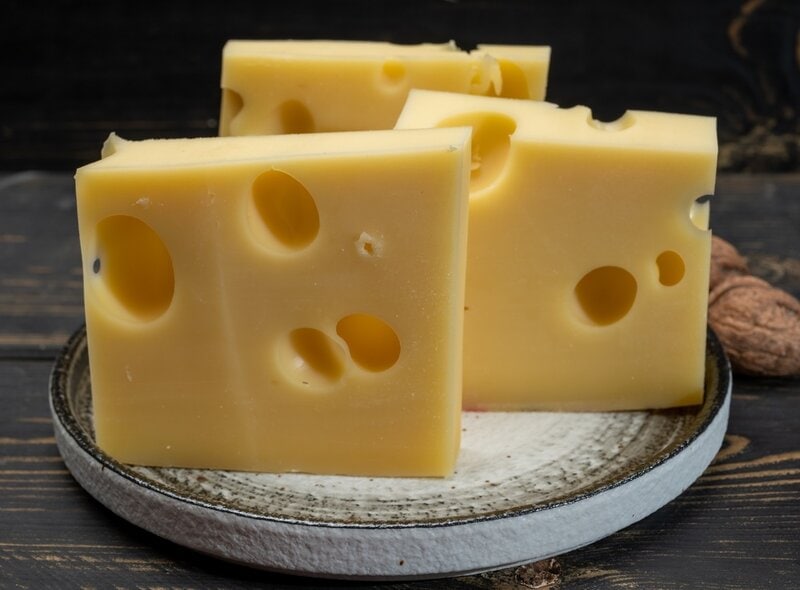If you are a dog owner and a cheese enthusiast, you may be wondering if it is safe for your pup to enjoy some Swiss cheese. After all, who doesn’t love the creamy, nutty flavor of a good Swiss?
The answer may surprise you. Yes, Swiss cheese can be enjoyed by most dogs – but only when it is served in its natural, unprocessed form. Too much cheese will pose a health risk. However, overindulgence can lead to digestive problems and even obesity. It is best to serve cheese in small amounts as an occasional treat.
In this blog, we’ll discuss the benefits and risks of giving your pup Swiss cheese and tips for safely incorporating it into their diet.
Is Swiss Cheese Safe For Dogs?

When it comes to cheese, Swiss usually isn’t the first type that comes to mind for dogs. However, some owners are concerned if cheese is safe for their canine companions. Well, yes! Swiss cheese can be an excellent snack for your pup.
Swiss cheese is an excellent source of protein and calcium, which can help provide your pup with the essential nutrients they need. Plus, it’s low in fat and contains lots of vitamins and minerals.
As long as you stick to smaller portions and don’t give your dog too much, Swiss cheese is perfectly safe!
Things To Consider
There are a few things to keep in mind when giving your pup Swiss Cheese. Always check the label for any added salt or spices, which can be dangerous for dogs. Also, some dogs may have allergies to dairy products like cheese.
If your dog has had adverse reactions or digestive issues after eating cheese, it’s best to avoid it altogether.
What Is Swiss Cheese?
Swiss cheese is made from cow’s milk that has been processed to create a unique flavor profile – nutty, creamy, and slightly sharp. Dogs really like eating Swiss cheese because of its soft texture and mild flavor. Your furry friends can enjoy it as a snack or treat, making them feel extra special.
Not only is Swiss cheese good for dogs, but it can also provide several health benefits.
Rich In Calcium And Vitamins
Swiss cheese is rich in calcium, which is important for the growth and maintenance of your pup’s healthy bones and teeth. It’s also packed with protein, vitamins A and B-12, necessary for muscle growth and healthy skin. Additionally, it contains other essential minerals like zinc, magnesium, and phosphorus.
Probiotics
In addition to its calcium content, Swiss cheese also contains probiotics which can help support digestion in your furry friend. The probiotics can help keep their gut healthy by breaking down food more efficiently and promoting the growth of good bacteria in their digestive system.
Low In Fat
Finally, Swiss cheese is low in fat and calories, so it’s an excellent snack for dogs watching their waistline. The mild taste of Swiss cheese also makes it a suitable choice for picky eaters. So if you’re looking to give your pup a special treat that’s healthy and delicious, try some Swiss cheese! They’re sure to love it.
When Is Swiss Cheese Okay For Dogs To Eat?
Swiss cheese is perfect for your pup as long as he is not suffering from dairy allergies. Because Swiss cheese is, like other cheeses, high in fat and calories, it should be given as a treat only. Avoid giving him too much at once or making it part of his regular diet to prevent obesity.
It is essential to always check the ingredients list on the cheese packaging before feeding your dog any type of cheese. Some Swiss cheeses may contain xylitol, a sugar alcohol that is toxic to dogs. If the ingredients list does not mention it, you can rest assured that your pup can eat the cheese safely.
Will A Little Bit Of Swiss Cheese Hurt My Dog?

For most dogs, Swiss cheese is safe to eat in small amounts. While there are some risks of lactose intolerance and excessive fat, these can generally be avoided by feeding your dog only a tiny amount of cheese as an occasional treat.
You should constantly monitor your dog and remove any leftovers so that there is no temptation for them to eat more than their body can handle.
Can A Dog Get Sick From Swiss Cheese?
Unfortunately, dogs can fall sick from having Swiss cheese. Dogs can be sensitive to certain ingredients found in Swiss cheese and can experience adverse reactions when they consume too much.
Swiss cheese is made with rennet, an enzyme that helps curdle milk during the cheese-making process. Rennet is often derived from animal sources, like the stomachs of calves or lambs, so it’s important to check what type of rennet was used in a particular brand of Swiss cheese.
Dogs can be sensitive to this enzyme and may experience digestive issues, such as diarrhea or vomiting, if they consume too much of it.
Can Feeding Swiss Cheese Cause Obesity In Dogs?
The first thing to remember when feeding your dog with Swiss cheese is its fat content. Too much fat can cause weight gain and obesity, leading to other health problems for your pup. Swiss cheese contains a considerable amount of fat and calories, but it does not necessarily mean feeding your pet can cause obesity.
Feeding your dog Swiss cheese as an occasional treat won’t do much harm. However, if you are feeding your dog large quantities of Swiss cheese regularly, this can contribute to obesity.
Are All Cheeses OK For Dogs?
Cheese can be a delicious snack for humans, but are they ok for dogs? No, not all cheeses are safe for dogs to eat. While many types of cheese are acceptable in moderation, some may present a risk to your canine companion’s health.
Cheese with particularly high amounts of fat and salt should be avoided, such as blue cheese or mozzarella. If your dog does consume a large amount of these kinds of cheeses, it may experience gastrointestinal issues like vomiting or diarrhea.
Some types of cheese are made with toxic ingredients for dogs. Soft cheeses like feta and goat cheese may also contain molds that could cause an allergic reaction in your pup. However, some types of cheese are safe for dogs to eat.
Hard cheeses, such as cheddar, parmesan, and Swiss, are all low in fat and salt and generally considered safe for dogs to consume in moderation. String cheese is also a good option as it contains less fat than other cheeses.
Is Swiss Cheese Safe for All Dogs?
Canine experts agree that cheese can be healthy and nutritious for dogs, but some types may not be safe. Swiss cheese is one of those varieties. It has a strong smell and taste that many dogs find irresistible, but it contains Listeria monocytogenes, which can cause foodborne illness in humans or animals.
Additionally, too much sodium can be bad for their kidneys and liver, so avoiding high-sodium foods, like Swiss cheese, is best. If you decide to feed your pup a small amount of Swiss cheese, ensure it is fully cooked and free from harmful bacteria or molds.
Precautions

Swiss cheese is safe, but there are some precautionary measures to take.
Prevent High-Fat Swiss Cheese
One of the main drawbacks of feeding Swiss cheese to any breed is its high-fat content. Dogs that are overweight or prone to weight gain may have an adverse reaction and could develop health complications if they consume too much cheese.
Potential Choking Hazards
While most dogs will properly chew and swallow the cheese, some breeds may have difficulty due to their smaller size or lack of chewing teeth. If a piece is too large, it can end up getting stuck in the throat and potentially cause an obstruction.
Avoid Processed Cheese
Dogs should never be fed processed Swiss cheese, as this type often contains high levels of salt and other additives that can cause digestive upsets or other health concerns. Stick with natural, unprocessed varieties whenever possible.





